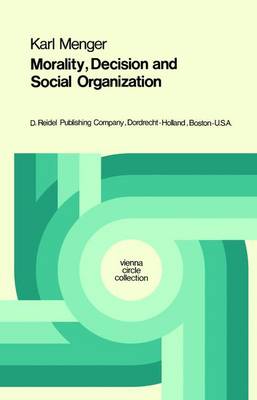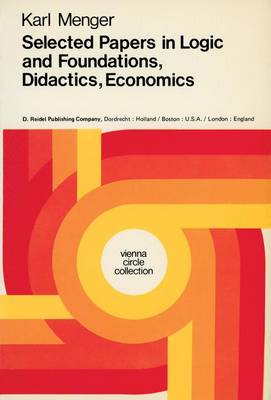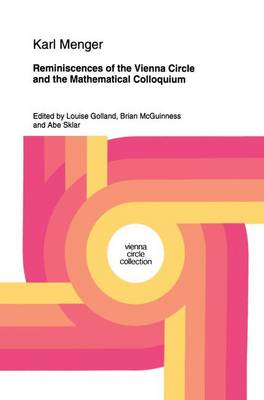Vienna Circle Collection
3 primary works
Book 6
Book 10
Selected Papers in Logic and Foundations, Didactics, Economics
by Karl Menger
Published 31 March 1979
This volume brings together those papers of mine which may be of interest not only to various specialists but also to philosophers. Many of my writings in mathematics were motivated by epistemological considerations; some papers originated in the critique of certain views that at one time dominated the discussions of the Vienna Cirele; others grew out of problems in teaching fundamental ideas of mathematics; sti II others were occasioned by personal relations with economists. Hence a wide range of subjects will be discussed: epistemology, logic, basic concepts of pure and applied mathematics, philosophical ideas resulting from geometric studies, mathematical didactics and, finally, economics. The papers also span a period of more than fifty years. What unifies the various parts of the book is the spirit of searching for the elarification of basic concepts and methods and of articulating hidden ideas and tacit procedures. Part 1 ineludes papers published about 1930 which expound an idea that Carnap, after a short period of opposition in the Cirele, fully adopted ; and, under the name "Princip/e of To/erance", he eloquently formulated it in great generality in his book, Logica/ Syntax of Language (1934), through which it was widely disseminated. "The New Logic" in Chapter 1 furthermore ineludes the first report (I932) to a larger public of Godel's epochal discovery presented among the great logic results of ali time. Chapter 2 is a translation of an often quoted 1930 paper presenting a detailed exposition and critique of intuitionism.
Book 22
Reminiscences of the Vienna Circle and the Mathematical Colloquium
by Karl Menger
Published 23 June 1994
Karl Menger was born in Vienna on January 13, 1902, the only child of two gifted parents. His mother Hermione, nee Andermann (1870-1922), in addition to her musical abilities, wrote and published short stories and novelettes, while his father Carl (1840-1921) was the noted Austrian economist, one of the founders of marginal utility theory. A highly cultured man, and a liberal rationalist in the nine teenth century sense, the elder Menger had witnessed the defeat and humiliation of the old Austrian empire by Bismarck's Prussia, and the subsequent establishment under Prussian leadership of a militaristic, mystically nationalistic, state-capitalist German empire - in effect, the first modern "military-industrial complex. " These events helped frame in him a set of attitudes that he later transmitted to his son, and which included an appreciation of cultural attainments and tolerance and respect for cultural differences, com bined with a deep suspicion of rabid nationalism, particularly the German variety. Also a fascination with structure, whether artistic, scientific, philosophical, or theological, but a rejection of any aura of mysticism or mumbo-jumbo accompanying such structure. Thus the son remarked at least once that the archangels' chant that begins the Prolog im Himmel in Goethe's Faust was perhaps the most viii INTRODUCTION beautiful thing in the German language "but of course it doesn't mean anything.


